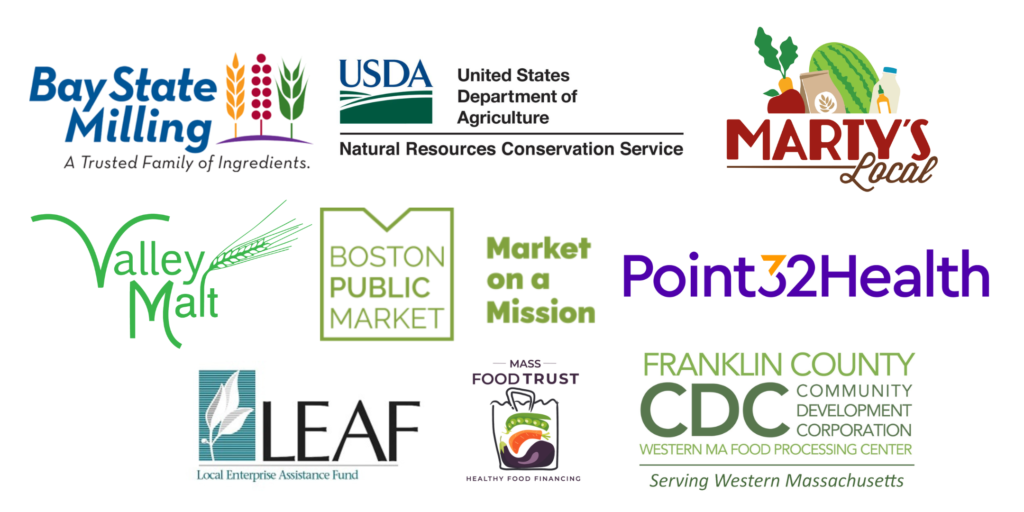The 2023 Forum was held on Friday, Dec. 8th from 8am – 4pm at Holy Cross in Worcester. We look forward to strengthening the statewide food community, discussing important food topics, and developing skills so we can all advocate for a stronger, more equitable MA food system. As of December 5th, the Forum is sold out.
Thank you to our 2023 MA Food System Forum Sponsors:

8:00am – Check in, Breakfast & Networking
8:45am – Welcome
9:30am – Morning Workshops
11:00am – Plenary session
12:30pm – Lunch & Networking
1:30pm – Speaking Program
2:00pm – Afternoon workshops
3:30pm – Meet and greet with MAFSC staff
Plenary Session
Reflections on the 2023 Growing Season: Where Do We Go From Here To Support Resilient Agriculture?
2023 saw devastating deep freeze, frost, and floods and rains across the Commonwealth. The public and private sectors pulled together quickly to respond to the need, but questions remain about policy and system changes to better support farmers adapting to a changing climate, and for an overall resilient local food system. This session will feature a few key players who will recap the growing season and brainstorm ideas about where we go from here. An afternoon breakout will follow this session to continue the conversation.
MORNING WORKSHOPS
Massachusetts is often at the forefront of food waste reduction efforts: the organic food waste ban was lowered last year, on-farm anaerobic digestion is well established, there are vibrant gleaning and food rescue organizations, more households are separating their food waste, and students are composting at school. However, food waste still comprises 22% of the waste stream. What is next for food waste reduction? Speakers will discuss opportunities to expand consumer education and advocacy, institutionalize food waste separation in schools, enable more people to compost in their own communities, and create the infrastructure to support these advances.
Can New England supply 30% of its food by 2030? A discussion of the research and next steps
A Regional Approach to Food System Resilience was just published by a New England Food Planners Partnership, including the Collaborative, about what it would take for 30% of the food consumed in New England to be regionally produced by 2030. Learn more about what the region can do to create a more resilient food system, including expanding farmland, making more local food available in grocery stores, and encouraging consumers to shift their food purchasing. Discussion will focus on how various entities in Massachusetts can help move toward this goal.
Food Security Campaigns Roundtable
This session will feature policy experts whose work is key to reducing the high rate of food insecurity in Massachusetts. The Feeding Our Neighbors, Lift Our Kids, Hunger Free Campus, Public Benefits Cliff Effect Pilot, and MA Emergency Food Assistance Program (MEFAP) campaigns will be discussed. Panelists will speak to the successes and challenges they’ve encountered while running these campaigns, where they expect the campaigns to go next, and what they see as the future of anti-hunger policy work in the Commonwealth. Join this session to get involved in their advocacy work!
Authentic community engagement for policy and system change
More food system organizations and coalitions have recognized the importance of including people directly impacted by their programs in decision-making processes. Discussion will go focus on lessons learned, best practices and different structures currently employed to share power and create spaces for authentic and equitable community engagement, and how this work can shape policy and advocacy.
How can municipalities continue to work with local food policy councils to improve the food system?
Municipalities across the state are noticing how critical it is to have robust, resilient food systems given health, economic, and social implications. More and more, we see municipalities employing ordinances, local programming, and various initiatives in support of local food systems; join this session to learn more about the latest tools municipalities are using to empower local food systems and what next steps could be taken to continue to support and strengthen local food policy councils.
AFTERNOON WORKSHOPS
Seafood 101
Join this session to hear from a panel of local fishermen about the issues facing their industries, from warming waters, increasing pathogens, and changing market forces, and learn about innovative ways fishermen are adapting.
Housing and food systems: mutually beneficial partnerships
Many food access programs were forced to pivot their operational models during the pandemic, leading to long term changes in program delivery. Speakers will discuss emerging partnerships with affordable housing authorities and organizations to deliver food security programming to more residents who could benefit from them, land trust coalition work, housing and food advocacy, and how housing and food system advocates could work together for a sustainable, resilient, equitable future.
Youth and the food system: how are we creating the next generation of food system leaders?
Like any system, our food system relies on passionate, knowledgeable practitioners who are willing to implement bold new policies, programs, advocacy strategies, and farming techniques. How are we building up young people to take on this work? Join this session to hear from food system stakeholders working directly with youth to build their skills and leadership abilities.
The Campaign for Food Literacy’s next steps
In 2023, the legislature included $1,000,000 in funding for food literacy programs in the annual state budget. The state’s Health and Physical Education guidelines were updated this summer for the first time in 20 years to include some food literacy concepts. What should our next steps be to continue to advance food literacy education? Join this session for a discussion led by J. Harrison to brainstorm about campaign strategy.
Next steps for a resilient local food system: Continuing the conversation from the plenary session.
Join this session to continue the conversation about supporting local farmers and building a resilient, equitable, and sustainable local food system! This session will be facilitated by Nathan L’Etoile, from American Farmland Trust.